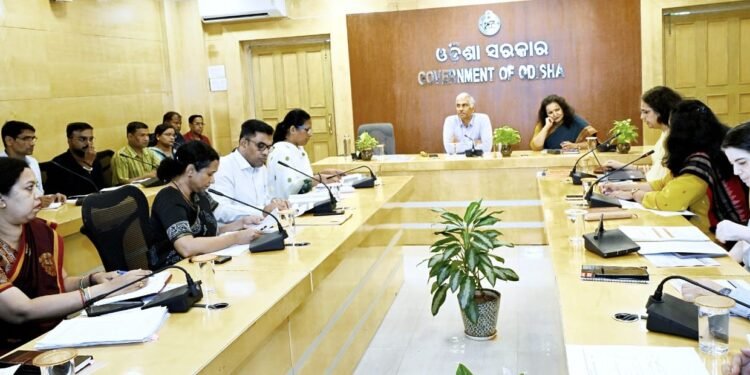Bhubaneswar- A high-level review meeting of the State-Level Child Protection and Welfare Monitoring and Review Committee was held at Lok Seva Bhawan under the chairmanship of Chief Secretary Manoj Ahuja. The session focused on assessing both institutional and non-institutional frameworks aimed at ensuring comprehensive care and protection for children across Odisha. Emphasis was placed on fostering stronger collaboration among departments and stakeholders to enhance child welfare delivery mechanisms.
The meeting highlighted the implementation of Mission Vatsalya and the roles played by various national and state-level bodies such as the State Child Protection Society, State Adoption Resource Agency, District Child Protection Units, Child Welfare Committees, Juvenile Justice Boards, and dedicated Juvenile Police Units. Odisha currently supports around 8140 children under institutional care and another 6317 under non-institutional care. A structured presentation by the Director of Women and Child Development detailed the scope of existing services including 160 children’s homes, 33 adoption agencies, and various other specialized care facilities operating across the state.
Adoption rates in Odisha have shown consistent growth, with in-country adoptions increasing annually and the number of girls adopted surpassing that of boys. Nearly all children in institutional care have been enrolled for Aadhaar. Vocational training has reached more than 8000 children and several have either gained employment or ventured into self-employment. Initiatives like the Ashirbad Yojana have been instrumental in extending financial aid and marriage assistance to children exiting institutional care. The state has also set up a network of Child Help Units, a functioning State Control Room, and integrated helpline services such as 1098, 181, and 112 for emergency support.
Key themes discussed during the meeting included mental health counseling for children who have experienced trauma, the expansion of smart education through digital tools, and the use of video conferencing for juvenile hearings. Programs like Mahak and Utsah were praised for promoting cultural and sporting activities, while yoga sessions and vocational training at World Skill Centres are shaping life skills for institutionalized children. Plans to operationalize the Amari Shishu Portal for digital tracking of child welfare data and to set up Child Help Centres at transportation hubs were also taken up.
The Chief Secretary underscored the importance of reinforcing all aspects of the child protection framework with accountability and active district-level monitoring. He urged departments such as Women and Child Development, Education, Health, Panchayati Raj, Home, and Skill Development to work in tandem. Senior officials were advised to make school and institution visits a part of their field tours to ensure direct engagement and oversight. The meeting was attended by Principal Secretaries, Commissioners, and senior officials from multiple departments, signaling a unified approach towards a safer and more supportive environment for children in the state.






